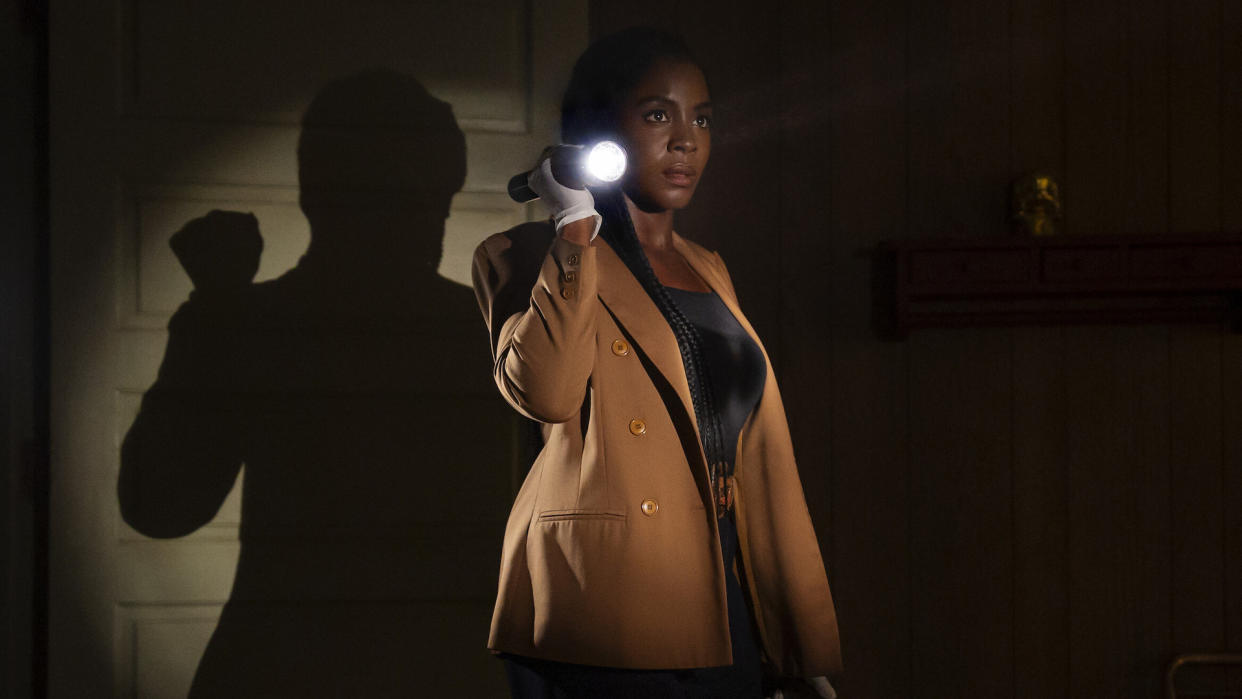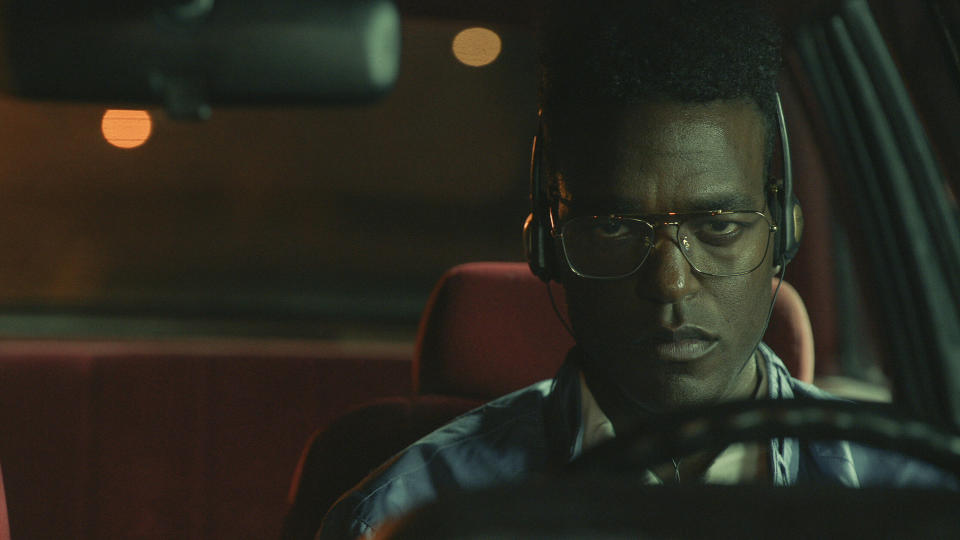How Little Marvin Rebooted ‘THEM’ Into a Certified Fresh Horror Anthology


It’s not every day that you come across someone whose IMDb profile starts with the title of Executive Producer. But not everyone is Little Marvin, the creator, head writer, and executive producer of “Them.”
Little Marvin knew he wanted to be a showrunner from the moment he learned the word, describing it as a “wonderful combination of things” that spoke to his obsessive nature and interest in every aspect of filmmaking. He worked as a creative executive, in marketing and advertising, “telling stories through brand building,” he told IndieWire.
More from IndieWire
“I loved the life, I loved what I was doing, and I felt very creatively fulfilled,” Little Marvin said. “But there was always this nagging dream that I had, like, ‘Okay, this is great, but what you really wanted to do was tell stories in this way.’ So four or five years ago, I just bit the bullet, quit my job and came back to L.A. and said, ‘I’m not stopping until I get it.'”
His first script turned out to be “Them: Covenant,” championed by executive producer Lena Waithe, which landed at Prime Video in 2018 after competitive bidding. Though Season 1 debuted to polarizing reception for depictions of graphic racial violence, Season 2 has 100 percent from critics on Rotten Tomatoes, with an audience score of 90 percent.
“Them: The Scare” takes place in 1990s Los Angeles, following two parallel stories: the inner and outer life of struggling actor Edmund Gaines (Luke James), and a series of gruesome, mysterious deaths being investigated by detective Dawn Reeve. In his second outing, Little Marvin seamlessly intertwines family history, procedural elements, and the seeds of both horror and crime thrillers to pay homage to genre favorites — all while creating something riveting and refreshing.
“The big significant difference is that I was alive,” Little Marvin said about moving from the ’50s to the ’90s. “I was a kid but I remember Rodney King, what that tape did; I remember the feeling of how it sent shockwaves not only through a city but through the world, and that was very much alive within me. It’s not that the story was about that, necessarily, but what an interesting and thorny and complex environment for a woman who’s a detective and a Black woman to navigate. So that I knew I wanted to feel different.”
Below, Little Marvin discusses tackling the second season from story and production angles, continuing his collaboration with Ayorinde, and inspirations for “Them,” including Korean cinema. It might be his only major TV credit, but it’s the work of a capable and confident creative voice — one that’s just getting started.
“What I tell people is that you never know how your life is preparing you for the thing,” Little Marvin said about his career trajectory. “Yes, nobody knew who the hell I was, but there were 10 years of preparation where I was learning every aspect of the gig without doing the gig, so that then when you get the gig, you’re like, ‘Oh shit, it’s kind of muscle memory. I’ve actually been doing this job and no one knew it.’ So it’s been tremendously fulfilling.”
This interview has been edited for length and clarity.
IndieWire: Did you always know “Them” was going to be an anthology?
Little Marvin: It was always going to be an anthology, that much I knew. I knew that every season was going to sort of pay homage to some of my favorite subgenres within horror, and the rest has been a lovely discovery.
What have been some of the specific subgenres?
Well the first season was very much inspired by my love of domestic horror of the ’60s and ’70s, when I think about “The Exorcist” and “Rosemary’s Baby” — even the ’80s, “The Shining” — those were all floating around my head in that first season. The second season it was really a love letter to ’90s serial killer thrillers, which was a very specific subset. Those were big in the ’90s and I loved all of them, none more than “Silence of the Lambs” and “Se7en.” So I knew those were going to be the things I wanted to play with in the second season.
In terms of the specificity of horror production, what were some ways you wanted to distinguish Seasons 1 and 2?
I think just sort of tonally. The ’50s to the ’90s — they were obviously different times. There were things about them that were similar, but there were also many things that were different. The first season was sort of designed to feel like a strait jacket. I remember “What does it feel like to be the sane family — with insanity at your door, but you’re the sane ones wearing the strait jacket?” That was the emotional and psychological inspiration for me with that first season. The second season, there was much more scope. It was a broader landscape I was playing with because we got to actually experience all of Los Angeles, and I think that that time, the ’90s and the Rodney King verdict, that demanded that we spread our wings a little bit, get outside of a single house and really feel the city.
As a viewer it feels like with Season 2 there is a trust that has been built. Season 1 is an era that people have learned about in history, in school, and in Season 2 there’s not racial violence in the same way — it’s microaggressions.
A thousand percent. Yes, and thank you for saying that — it’s less overt, but no less toxic in its own way, right? I think that’s the interesting subterranean landscape, particularly with horror, that we get to navigate here; it’s not so much in your face but you can kind of feel it, and that ickiness is always kind of out there and skirting around the edges. Exploring it in a more subtle way was actually really fun. The first season was definitely designed to be a sledgehammer, it wasn’t trying to fuck with your feelings. It had some things it wanted to say. But the second season it was fun to go in a different direction and energetically feel something different.
How did you feel coming off Season 1?
I was ready to take a great big old break after it came out, but I was excited. I was really moved — it was all the feelings. It was an explosive reaction to that first season; it was also a very different time. Go back only three years and we were in sort of the height of the pandemic, George Floyd had been murdered and there was global, racial, society unrest. We were feeling very destabilized. It’s not that we’re still not there, I don’t mean to say we’re in a much different time, but it was. It was psychologically different. So now to kind of pick up the story again but in a different time with a different set of circumstances and a different brain, really, coming out of that time, it was fun to go back and explore it from a different place mentally.
Tell me about expanding your collaboration with Deborah, who you’ve described as a muse and so trusted with your material.
She is the must and she is my rock. She was the rock of the first season, emotionally. She’s also just the consummate professional. She is such a joy to work with on top of being such a brilliant actor. I found as I sat down to write — it really wasn’t intentional, I was trying, desperately, actually, if I’m being very honest, to think of someone else. I was like “Put it away, she did the role, let’s stop thinking about her and try to open our mind up to someone else,” but as I was creating Dawn I just kept seeing Deb say the lines, I kept seeing her embody the character. So it was very clear to me that either I listen to that or I went crazy, so I listened to it. And thank god she came back, that was a gift.
Dawn feels very lived in from the very beginning, which I was really struck by. She’s so fully formed and such a commanding presence… this isn’t a question, I’m just praising her.
No I really appreciate that! I call Deb my Clint Eastwood and it’s a compliment in the sense that I mean she’s just rock steady. She holds the center of the frame, you always know you’re going to be held by a performance which is riveting. She manages this sort of beautiful simplicity but you can feel everything underneath it at all times. I don’t know quite how she does it, but she’s phenomenal in that regard. I’m very very lucky to have collaborated with her, to find her.

And if we’re talking about performances we have to talk about Luke James, who just flattened me. I saw your Instagram post about his casting.
That was a process. To say that we found him in the 29th hour, honestly, would have been an understatement. It was more like the 45th hour. We were into production, and I still had not officially cast that part. I have to give props to Junie Lowry-Johnson and Libby Goldstein, our phenomenal casting directors, who are intrepid and a thousand percent committed, and like me, we want the best person. It’s [not] to say that we hadn’t met phenomenal actors, there were many, but there was a very specific combination of traits that I wanted from this character. He obviously had to terrify you, but he had to engender a level of compassion and empathy. If you didn’t somehow feel for him, I knew the monster wasn’t going to work. You had to feel the man within the monster. So that was just a process and I’ll never forget — Luke came in and he came out of the trailer — I remember seeing him with the High Top Fade, and the Members Only jacket and the glasses and I was like, “Oh my God.” It was like he’d sprung fully formed out of my imagination. Half the job was done, just seeing him come out. And then you’re praying, like, “I hope he’s good.”
I’ll never forget the first day, because he had a very difficult scene. It was a scene of self harm. It was the very first thing he was supposed to do. And I remember I turned to the first A.D. I’m like, “Surely, there’s something else this poor guy can do on his first day.” She’s like, “You wrote it, there’s not.” Touche! We all gritted our teeth and when I tell you that from the minute we called action, it was just miraculous. He had just walked in the building. And much like Deb, he’s an agile, fearless, committed, passionate and just lovely human, which makes the job fun. The audience doesn’t get to know that part of it, but he’s just a truly lovely artist and it was a miracle. There was definitely some alchemy afoot.
And again, props to our Caprice, our hair lead and props to Lynn Falconer, our costume designer, [for] capturing the 90s in a real way — because there’s a world where it can also be kind of kitsch, and we definitely wanted to skirt away from that and make it feel grounded and real. They did a phenomenal job.
That’s always kind of the fear with horror, that you’re going to cross that line a little bit too much. Your productions have done a great job of staying on the more real side of that. The production design is so rich, Can you tell me more about building out the world in a more tactile, visual sense?
It was a joy. Again, you’re only as good as the team. Across the board, it was just aces on in every department. Referencing those movies from the 90s — even in my memory, I used to remember when I would fly back from being home, back to UCLA, where I went to school. Flying into LAX, there was always this blanket of smog, super dense. My memories are sort of filtered through that feeling, and I knew I wanted to capture that; there was a textural component to the atmosphere, and I wanted you to feel the haze and feel that kind of orange quality. Me and Brendan Uegama, our brilliant DP, had many conversations about like, what does a West Coast response to “Se7en” [look like]? Because “Se7en” was gritty in a completely different way. It was rainy, it was dirty, it was mucky, but what would the West Coast equivalent of that be? We had many conversations about light and and what we see and the density of the atmosphere. David Batchelor Wilson, our production designer, is just a genius; every set was like walking into a dream. It’s all about the team — we had a great one.
Is there anything you felt like you learned on Season 1 to take into Season 2?
Tons of things. It was a different story, so it demanded different things of us. I was excited to explore a story with a with more twists. I came into the room knowing some significant surprises that I wanted to kind of pull off, and then with the writers to really kind of craft a season that again, had more scope, had more sort of twists and turns, and didn’t tell you everything that was up its sleeve — hopefully, that’s what we endeavored to do anyway, pull you in and then surprise you with some things. So it was fun to craft a new story, that was a blast.
The story really kept me hooked throughout, because there’s so many different elements; the family mystery, Edwin descending into his arc, the murder mystery. It doesn’t feel like they should fit together so well, but they do.
Thank you for saying that. That really means a ton. We certainly hoped that that would be the case. I’m a huge, huge fan of Korean thrillers and Korean horror and Korean cinema in general, because I feel like they do exactly what you just said; they’ve got this tremendous ability to — one minute you’re watching a serial killer procedural, the next minute it’s like a domestic melodrama, then in the third act, it suddenly gothic horror, and you’re like, “What the fuck am I watching?” And somehow it all hangs together in a beautifully cohesive way.
I’ve always loved that, and that always sort of sticks in the back of my head. Things don’t have to be one thing. Sure, it’s horror, and you referenced the the domestic procedural. I knew that on one half of the story, it was a forensic procedural, because it was a criminal procedural, and there were serial killer beats and a storyline that we wanted to follow. But I also knew just as important to me was this like emotional forensic journey, that as your detective is peeling back layers of a crime, she’s also peeling back layers of her own identity, and figuring out who she is and who her mother is and who her family is. If both of those things didn’t have equal weight, it wasn’t going to really work. So we endeavored, that was the hope, anyway. The ambition was to get there.
And then, of course, we have the reveal of the Season 1 connection. At what point in the creative process did that come in?
From the beginning. The significant, big, kind of architectural beats, surprises along the way… I knew those going into the room, and I definitely knew that, “Holy crap, if we’re able to pull off that ending, then yay.” And it excited me to no end from the beginning. So yeah, that was sort of baked in.
I also wanted to ask about the name. It reveals itself as the season goes on, but it’s also very simple yet striking.
It terrified me actually calling it that, to be honest. Like, what, if it’s not! There was, there was a little of that feeling of, “Uh oh, you’re really digging yourself one by calling it this.” But it also terrified me in a good way. The title was sort of vague enough to be indicative a number of things. Like yes, there was the horror part of it, which goes without saying, but also there was this atmosphere, this sort of scary atmosphere that this woman’s navigating that was strange, and I wanted it to go to emotionally scary places, and psychologically scary places with both Edmund and Dawn. And so then the word took on other meanings, and I began to see it in broader way and not scare myself away from it.
“THEM: The Scare” is now streaming on Prime Video.
Best of IndieWire
2023 Emmy Predictions: Who Will Win at the Primetime Emmy Awards?
2023 Emmy Predictions: Outstanding Documentary or Nonfiction Special
2023 Emmy Predictions: Outstanding Documentary or Nonfiction Series
Sign up for Indiewire's Newsletter. For the latest news, follow us on Facebook, Twitter, and Instagram.

 Yahoo News
Yahoo News 
